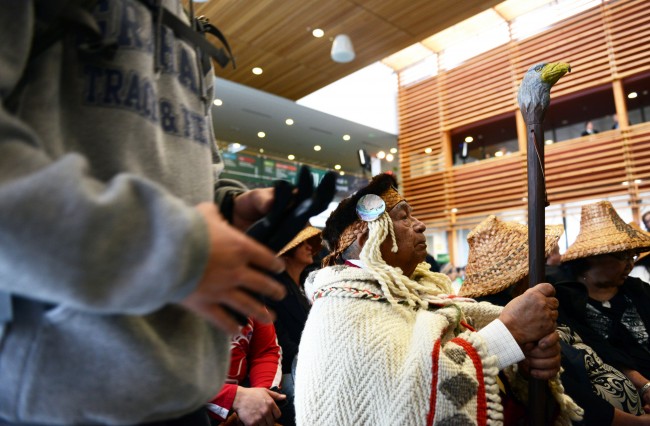
“UFV is situated on unceded Stó:lo territory.”
Most students at UFV have heard this introduction numerous times, but the new Indigenization Committee of Senate is working to bring more meaning to those words.
“The [Indigenization] committee of Senate is going to advise on more things than recruitment and retention and community priorities, but also look at curriculum and those tough things,” explains Shirley Hardman, UFV’s senior advisor on indigenous affairs.
Mark Point, a Stó:lo educator and previous UFV aboriginal coordinator, has recently been appointed chair of the committee. Because the committee is still in its founding stages, a concrete list of goals has not yet been made, but Hardman notes that its primary focus is to promote indigenous education.
“The primary focus is on indigenous education and how we set the bar higher to meet the needs of aboriginal and non-aboriginal students with regards to indigenous education,” she explains. “Some of it is about changing policy and curriculum so that we’re including aboriginal ways of knowing and being across the curriculum for all students.”
Unlike the Board of Governors, which deals with finance and management, Senate focuses on academic issues, and the committee will work closely with Senate to ensure that indigenous education needs are being met.
“I think it’s another way using our governance structure to bring in an indigenous voice and have a better understanding of that as we make decisions about academic policies or curriculum and not just rely on our own expertise, but also bring in from the community itself and bring that into the Senate discussions,” says vice provost and associate vice-president academic Peter Geller.
Unlike any of Senate’s other committees, the indigenization committee will have members from outside UFV.
“Senate is usually faculty members, administration, staff, deans, so we thought it was also important to have members of the indigenous community … who wanted to get engaged and help us have that conversation,” Geller says. “Also, it’s a way to connect what we’re doing with the aboriginal community as well and bring those voices in dialogue with UFV.”
Recruiting outside members was something completely new to Senate. The process included talking with chiefs, councils, and various aboriginal organizations, including the Stó:lo nations and the Stó:lo tribal council.
“We had some community consultations, but wze also asked indigenous faculty and staff and the elder-in-residence [for] their ideas,” Geller adds.
Along with the outside members, the committee is made up of faculty members who, as Geller explains, “have expertise either teaching indigenous studies or experience working within the indigenous community,” as well as two self-identified aboriginal students.
While the indigenization committee will be the first of its kind on Senate, UFV has seen something similar before with the still-existing aboriginal community council.
“There is an existing aboriginal community council that was formed and that is turning more to looking at supporting student services and student success … this is more related to the curriculum and academic policies and that sort of work,” Geller explains.
Many Canadian universities are making efforts to indigenize, but UFV is one of only three in the province that has a specific committee of Senate focused on it, alongside Thompson Rivers and UNBC.
“It’s something that many universities are realizing that we need to address from the perspective of better serving aboriginal students, and also making the university a place that everybody, every student, would understand something about this place from an indigenous perspective,” Geller says.
But while other universities may not have indigenization committees of Senate, that doesn’t mean that they’re not working to indigenize their curriculum. Some universities, like Lakehead University and University of Winnipeg, have included a mandatory indigenization course in their graduation requirements.
UFV has a variety of indigenous studies courses, and an indigenous studies major and minor are currently awaiting approval from the Ministry of Advanced Education. However, UFV isn’t planning to make any of these courses mandatory; instead, it’s working to indigenize all of its courses.
“I like our approach right now where people are introduced to these concepts in English 105 for example — students are receiving that without having to sign up for a special course,” Hardman says. “Students don’t have to take a specific course, but they won’t be able to leave here without having been introduced and having the opportunity to delve more deeply into indigenous studies.”
For Hardman, the committee couldn’t have come at a better time.
“In the past, we as a country, as a province, as a community, have suffered historic amnesia,” she says. “There are so many things that we don’t know about aboriginal people in Canada.”
Hardman sees this “amnesia” as a result of a lack of indigenous education.
“The amnesia is that it hasn’t been a part of our education,” she explains. “There’s so much that we don’t know and when we don’t know, we’re uninformed, we jump to conclusions, we buy into stereotypes we don’t understand.”
Geller shares the same sentiment, and sees the committee as a responsibility of the university.
“We don’t have all the answers within the walls of UFV. We need to go out and engage, and this is one way to do that.”


